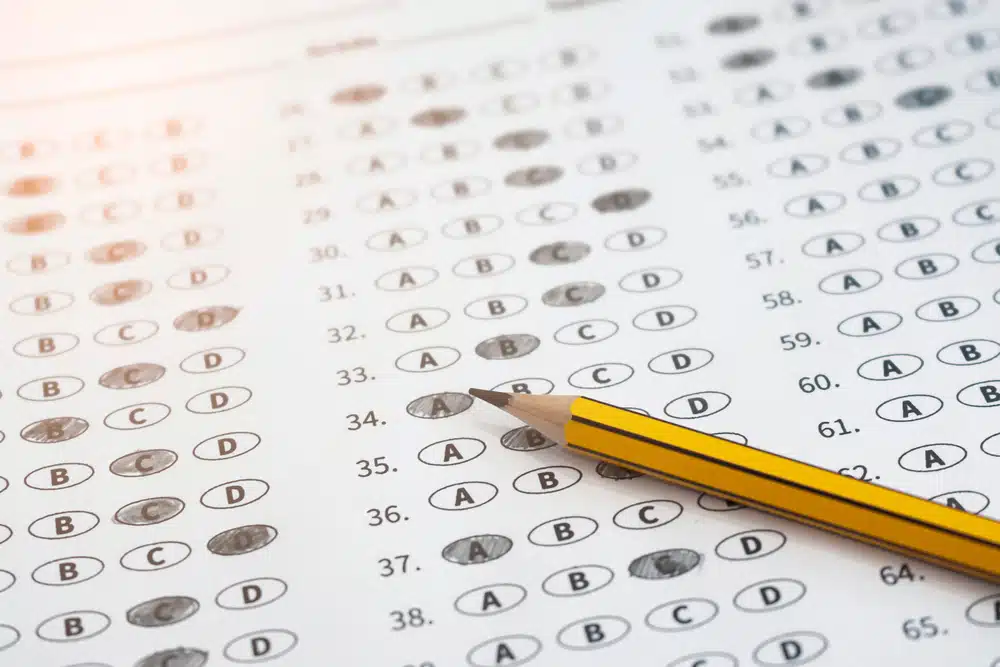What SAT Scores Do I Need to Get into the Ivy Leagues?
Every year, hundreds of thousands of high schoolers take the SAT in order to make their college applications stronger. Although many students try their hardest to nail this standardized test, not many take the time to understand the precise score required to get into the school of their choice. When you’re aiming to attend top-tier schools like the Ivy League, it’s vital that you understand exactly what you need to remain competitive during the application process. That includes standardized test scores. If you’re wondering “what SAT score do I need to get into the Ivy Leagues?”, you’re in the right place.
Most schools across the country, both private and public, require students to submit at least one standardized test score. The ACT and SAT are the two most commonly submitted and accepted tests. We’ll be focusing solely on the latter in this article. It’s important to note that many Ivy League schools require the SAT but don’t have a cut-off score.
In other words, these universities aren’t going to automatically disregard your application just because of a lower SAT score. However, that doesn’t mean poor performance on this exam won’t negatively impact your chances of getting accepted.
But just because schools don’t come out and officially state what scores they look for from applicants, that doesn’t mean these numbers don’t exist. Unlike other components of the application such as essay responses, extracurricular activities, and letters of recommendation, SAT scores are measurable and objective.
This makes it easy and accurate to compare scores between all applicants. Although many other factors are taken into account when determining who gets accepted and who doesn’t, higher SAT scores are always going to help boost your chances.
Are SAT scores required for the Ivies?
Let’s kick things off with the most obvious question on the minds of high schoolers. Are SAT scores even required for the Ivies? You’ve got a million and one things to do when applying for college and no time to do anything that’s not absolutely necessary. We get it.
But Ivy League schools do require applicants to send the scores from at least one standardized test: either the SAT or ACT. Beyond that, each university has specific requirements when it comes to submitting test results for the SAT. Some require students to send in all exams that were taken while others accept the highest score.
Will taking the SAT to increase my chances of getting into the Ivy League?
The Ivy League is notorious for being very difficult to get into. Each school is known for highly selective acceptance rates and daunting admission processes. As a result, high schoolers with their sights set on these prestigious universities are always looking for ways to increase their odds of getting accepted.
Given that the SAT is a requirement by most Ivies and not something applicants can tack on to stand out, it’s naturally a question of whether taking the SAT can boost a student’s odds of getting into their dream school.
In reality, simply taking the SAT will qualify you for consideration. In order to have this portion of the application enhance your chances of getting admitted, you’ll have to perform well. Keep in mind that your scores are going to be compared to those of other applicants.
As we discussed before, you should always be seeking to score higher than the average of students accepted to your dream school. You can think of your SAT score like your GPA. You’re required to submit a GPA to even get consideration from admissions officers. However, in order for the GPA to actually work in your favor, it has to be impressive.
SAT Frequently Asked Questions
What is the SAT?
The SAT is a widely accepted standardized test utilized by college admissions counselors to determine a candidate’s academic capability on the collegiate level. The Scholastic Aptitude Test has been a staple of college admissions since 1926. It’s published by a nonprofit known as the College Board. Like many standardized tests, the SAT is a pencil-and-paper and multiple-choice exam.
When should you take the SAT?
It’s advisable to take the SAT in the spring of your junior year. This gives you enough time to retake the exam if you want to attempt to get a higher score. SAT exams are administered each year in June, May, March, December, November, October, and August. They’re offered at multiple testing centers throughout the US.
What’s on the SAT?
The SAT is broken into two different sections: evidence-based reading and writing and math. There’s also an essay section that is optional.
How long does it take to complete?
It takes three hours to complete the standard portion of the SAT. If you opt to complete the essay portion, it can take an extra 50 minutes. As the SAT is a timed exam, whatever you don’t finish won’t get scored.
How is it scored?
Both sections of the SAT are scored on a point scale ranging from 200 to 800. The total score, known as the SAT Composite, is a combination of your results from the Math and Reading and Writing portions. The highest score you can get is 1600. Students who decide to complete SAT option essays will get a separate score.
How do I register for the SAT?
Registration for the SAT takes place directly through the College Board site. In general, deadlines for registration fall roughly five weeks ahead of the test date. It’s advisable to register as early as possible to secure a spot as it’s possible for locations to fill up quickly.
Should I take the SAT or the ACT?
One of the toughest questions applicants have to answer is which standardized test to take: the SAT or the ACT. Both exams seek to achieve the same goal: determining a high schooler’s ability to engage with collegiate-level material.
When seeking to earn a spot at an Ivy League school, you’ll definitely want to put your best foot forward. As a result, it’s a good idea to choose the exam you feel matches your strong suit best. The primary difference between the ACT and SAT is content. While there’s a lot of overlap, an important distinction is the inclusion of a science section on the ACT.
The SAT, as we’ve mentioned before, only has a Reading and Writing and a Math section. The ACT, on the other hand, includes a portion focusing on science-related topics. If you’re pursuing a degree in the sciences or feel particularly well-versed in these subjects, the ACT might be the best choice for you. However, if you feel more comfortable with math and reading-related content, you might want to opt for the SAT. Of course, you can always take both exams if you prefer. However, you have to manage your time (and funds) wisely.
Harvard University
Unsurprisingly, Harvard applicants have some of the highest SAT scores with the 25th percentile scoring 1460 and the 75th percentile receiving a whopping 1580 – nearly a perfect score. In order to have your application stand out from the crowd, you should aim for a 1580 or above. However, if you happen to fall closer to the average of 1510, you’re still doing great.
Here’s how the scores were broken down by section:
| Section | 25th Percentile | 50th Percentile (Mean) | 75th Percentile |
| SAT Total | 1460 | 1510 | 1580 |
| SAT Reading | 720 | 750 | 780 |
| SAT Math | 740 | 760 | 800 |
Yale University
The average SAT score among Yale applicants is 1515. If you want to stick out, you should strive to score around 1560, which is the 75th percentile. This ensures admissions officers will recognize your application as above-average. However, you’ll do just fine with a score closer to the average.
Here’s how the scores were broken down by section:
| Section | 25th Percentile | Average (Mean) | 75th Percentile |
| Composite | 1470 | 1515 | 1560 |
| Reading + Writing | 720 | 745 | 770 |
| Math | 740 | 770 | 800 |
Brown University
Brown University applicants received a 1485 average score on the SAT. The 25th percentile score is 1420 while the 75th percentile is 1550. Anything around 1550 will greatly increase your chances of getting into Brown although scores closer to 1500 should still strengthen your odds.
Here’s how the scores were broken down by section:
| Section | 25th Percentile | Average (Mean) | 75th Percentile |
| Composite | 1420 | 1485 | 1550 |
| Reading + Writing | 700 | 730 | 760 |
| Math | 720 | 755 | 790 |
Columbia University
If you’re eager to get into Columbia, the 75th percentile score of 1560 is your target. This represents the upper-echelon of Columbia applicants. However, any score close to the average of 1505 should still ensure your application gets a strong consideration.
Here’s how the scores were broken down by section:
| Section | 25th Percentile | Average (Mean) | 75th Percentile |
| Composite | 1450 | 1505 | 1560 |
| Reading + Writing | 710 | 735 | 760 |
| Math | 740 | 770 | 800 |
Princeton
Princeton ties Harvard with having the strongest SAT score averages from applicants. The 25th percentile score is 1460 while the 75th percentile score is an impressive 1580.
Here’s how the scores were broken down by section:
| Section | 25th Percentile | Average (Mean) | 75th Percentile |
| Composite | 1460 | 1510 | 1580 |
| Reading + Writing | 710 | 740 | 770 |
| Math | 730 | 755 | 780 |
Cornell University
The average SAT score for Cornell applicants is 1480. For students who want to score above-average, the 75th percentile score of 1540 is the target. The 25th percentile is 1420 and should act as the barrier of what you should strive to score above.
Here’s how the scores were broken down by section:
| Section | 25th Percentile | Average (Mean) | 75th Percentile |
| Composite | 1420 | 1480 | 1540 |
| Reading + Writing | 680 | 720 | 760 |
| Math | 720 | 760 | 800 |
Dartmouth College
The 25th percentile SAT score for Dartmouth applicants is 1450 while the 75th percentile score is 1550. If you score above a 1550, you’ll be in a great position to get into Dartmouth with above-average credentials. Still, there’s no required SAT score for Dartmouth, meaning all applicants will get considered no matter their score.
Here’s how the scores were broken down by section:
| Section | 25th Percentile | Average (Mean) | 75th Percentile |
| Composite | 1450 | 1500 | 1550 |
| Reading + Writing | 710 | 740 | 770 |
| Math | 730 | 760 | 790 |
University of Pennsylvania (UPenn)
Admitted applicants at UPenn have an average score of 1500 out of 1600 on the SAT. The 25th percentile score comes in at 1440 with 1560 representing the 75th percentile. This means that you’ll have to aim for at least 1560 to score above average in the UPenn applicant pool.
Here’s how the scores were broken down by section:
| Section | 25th Percentile | Average (Mean) | 75th Percentile |
| Composite | 1440 | 1500 | 1560 |
| Reading + Writing | 700 | 730 | 760 |
| Math | 740 | 770 | 800 |
What SAT score do I need for the Ivies?
When applying to the Ivy League, specifics are important. Although the Ivies have a tremendous amount in common including world-class academic offerings, a wealth of resources, and top-tier faculty, there are still some important distinctions between each university. As an applicant, it’s imperative to identify the admissions differences of the Ivies so you can accurately tailor your application. However, that doesn’t keep applicants from wondering what it takes to compete for the Ivy League as a whole. Since we’ve already discussed the specific SAT scores required to get into each of the Ivies, we can take a look at the bigger picture.
College admissions information reveals that students hoping to get accepted into the Ivy League should have at least 1470 on the SAT. At a minimum, you should aim to score between the 75th and 25th percentiles of any given university.
If you score above the 75th percentile, you’re doing excellent! Students falling below the 25th percentile, should retake the exam and work hard to improve their score moving forward. We always advise students to treat each Ivy League school individually instead of approaching any school from this prestigious group similarly. There are important differences between each in terms of requirements.
Tips for Improving Your SAT Score
Don’t Take It (If It’s Not Your Strength)
At times, the SAT and ACT are spoken of interchangeably. It’s understandable since both of these standardized tests have become the standard for college applicants. However, these tests come with some important differences. Since most Ivy Leagues accept both exams, there’s no reason to focus solely on the SAT if you would perform better on the ACT.
As mentioned before, the ACT has a stronger focus on science-related topics. If you don’t feel confident in these areas, the SAT might be a better option. Taking the exam you feel more confident with can ensure you receive a higher score. Of course, if you have enough time and don’t mind paying the fees, you can take both the SAT and ACT to see how you perform comparatively.
Take It Multiple Times (But Not Too Many)
One of the best things about the SAT is that students are welcome to take it more than once. The College Board – the nonprofit which hosts the standardized test- don’t place a limit on the number of attempts each student makes. However, you’ll have to pay for each test.
If you’re willing to front the costs, you theoretically have unlimited attempts to get that coveted perfect score. Despite this potential, it’s still advisable to only take the test two or three (maybe four) times. Why not more? Well, too many attempts will reflect poorly on your overall application no matter how good the final score.
Work With a Professional
The SAT is an indispensable part of the college admissions process. If you want to nail your Ivy League application, it’s advisable to seek professional support for standardized tests. AdmissionSight is a college entrance expert with over a decade of experience helping students prepare for the SAT.
We’ll work one-on-one with you to ensure your final score is competitive for the Ivies. You’ll learn what topics to expect on the exam, how to take tests under pressure, and the best methods for studying. We’ve helped countless students perfect their SAT scores. Let us help you next.
Claim Your Spot in the Ivy League
Have you been dreaming of attending an Ivy League school but aren’t sure how to start? We can help put you on the right track. How do we know? For the past decade, we’ve been helping students just like you prepare stellar applications to drastically increase their chances of getting into some of the nation’s leading schools. Beyond standardized test preparation, we help students in a wide variety of other areas including:
- Interview Preparation
- Essay Editing
- Academic Planning
- Extracurricular Planning
All of our services are individualized to meet the specific needs of each student. Our entrance experts will take your academic strengths, personal interests, and professional goals into account when optimizing our offerings. If you’re ready to secure a spot in the Ivy League, contact us today to get started.










































